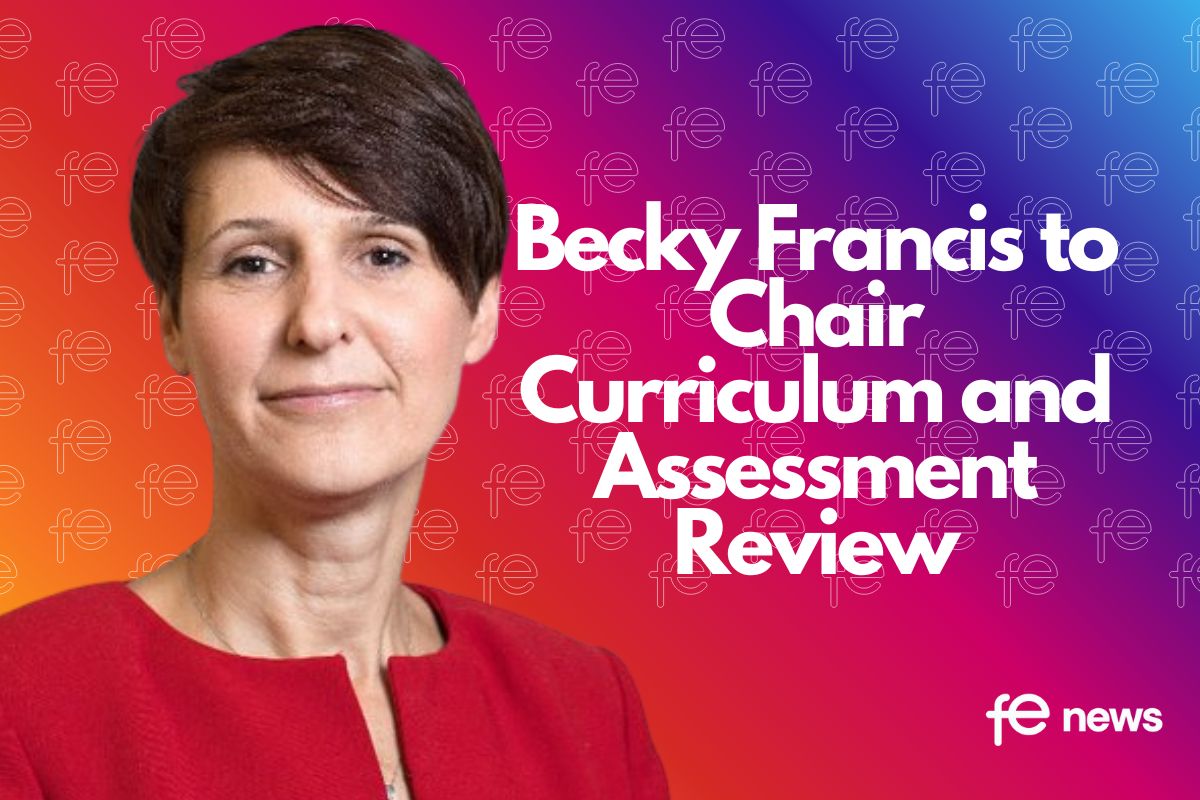Becky Francis to Chair Curriculum and Assessment Review

- Leading education expert, Professor Becky Francis CBE, named as Review Chair
- High and rising standards, alongside a broader and richer curriculum, central to government vision to set every child up for the future
- Input from teachers and leaders will inform recommendations, as part of sector reset
A broader, richer, cutting-edge curriculum that drives high and rising school standards and sets all young people up for life and work will be central to the government’s vision for education, as it launches its wide-ranging Curriculum and Assessment Review today (19 July 2024).
Spanning from Key Stage 1 through to Key Stage 5, the independent review will be chaired by Professor Becky Francis CBE, an expert in education policy, including curriculum and social inequality.
The review will look closely at the key challenges to attainment for young people, and the barriers which hold children back from the opportunities and life chances they deserve – in particular those who are socioeconomically disadvantaged, or with special educational needs or disabilities (SEND). High and rising school standards are at the heart of the government’s mission to break down barriers to opportunity and give every child the best start in life.
Following the review, all state schools – including academies that currently do not have to follow the national curriculum – will be required by law to teach the national curriculum up to age 16, giving parents certainty over their children’s education. This was confirmed in the King’s Speech earlier this week, as the government will introduce a children’s wellbeing bill in the next year to legislate for a variety of its education policies.
Education Secretary Bridget Phillipson said:
“The launch of this review is an important step in this government’s mission to break down barriers to opportunity, deliver better life chances and enable more young people to get on.
“Our dedicated school and college staff deliver better life chances for countless children but for too long they have been held back by a curriculum and assessment system that fails to prepare enough of our children for work and for life.
“That is why this government, alongside leading education experts, leaders and staff on the frontline, will breathe new life into our outdated curriculum and assessment system.
“Our renewed curriculum, built on a foundation of high and rising standards, greater access to cultural learning and crucial work and life skills, will set up all our children to achieve and thrive in the workplaces of the future, and throughout their lives.”
The government’s ambition is for a curriculum that delivers excellent foundations in reading, writing and maths, and ensures every young person gets the opportunity to develop creative, digital, and speaking and listening skills particularly prized by employers.
The review will also seek to make sure children benefit from a curriculum that represents them and their families, regardless of background and equips young people to shape our response to the challenges of our changing world.
The review will build on the hard work of teachers who have brought their subjects alive with knowledge-rich teaching, to deliver a new national curriculum which is rich and broad, inclusive and innovative.
The review will look at ensuring all young people aged 16-19 have access to rigorous and high-value qualifications and training that will give them the skills they need to seize opportunity as well as ensuring they are ready for the changing workplace.
It will also look at whether the current assessment system can be improved for both young people and staff while protecting the important role of examinations.
Professor Becky Francis said:
“Ensuring all young people access a rich and fulfilling curriculum and meaningful qualifications is core to supporting them to thrive at school and later in life.
“It’s a real privilege to lead this important review, which has huge potential to build a cutting-edge curriculum that works for pupils and teachers alike.
“I know how stretched schools, colleges and their staff are. So it’s particularly important to me to consider how any changes could contribute to staff workload and to avoid unintended consequences.
“Crucially, I want to make sure that the review and its recommendations are driven by evidence and a commitment to high standards for all our young people, irrespective of background.”
The views of experts, parents, teachers and leaders will be pivotal to the recommendations and a call for evidence will be launched in September. The review will also take written evidence from key stakeholders and undertake a national roadshow, meeting and taking input from staff on the frontline.
The launch of the review marks one of the government’s first steps towards an education system driven by high and rising standards, where background is no barrier, and every young person leaves school or college with the best life chances.
In recognition of the pressure schools and colleges are already under, and the further strain that wholesale reform can bring, the review will seek evolution not revolution, and will be alive to the trade-offs required to deliver high and rising standards alongside greater breadth – in particular any recommendations that would increase workload.
Professor Francis will be supported by an expert group made up of individuals with experience right throughout the education system. The review will publish recommendations in 2025.
Sector Reaction
Dame Christine Gilbert, Chair of the EEF, said:
“This is an important and challenging review and it is a tribute to Professor Francis’ many achievements, impressive skills and expertise that she has been invited to lead it. A common thread running throughout Becky’s career has been a laser-like focus on addressing educational inequalities. I have no doubt that she will bring this commitment to the review.
“Throughout her professional life, Becky has worked closely with teachers and policymakers, spearheading major research programmes that have investigated the impact of reforms in the school system. In her role as CEO at the EEF since January 2020, she has been dedicated to breaking the link between family income and educational achievement. She has focused on building and sharing the evidence base of what works – and what doesn’t – to support great teaching and learning.”
For the period of the Review, Professor Francis will be on secondment to the DfE, where she will be acting independently as the Lead Reviewer as appointed by the Secretary of State. She will temporarily step back from her role at the EEF when she takes up the post in early August.
Dame Christine Gilbert, currently EEF Chair, will provide additional time and extra support to the organisation as Executive Chair. The EEF’s Directors of Impact and Research, Chris Paterson and Emily Yeomans respectively, will provide interim leadership as joint CEOs.
Pepe Di’Iasio, General Secretary of the Association of School and College Leaders, said:
“We’re pleased that Labour is moving quickly to begin its promised review of curriculum and assessment. Professor Becky Francis is an excellent choice to lead on this work, is respected across the profession and will follow the evidence of what works.
“We are delighted that the review will put a particular focus on making sure that the curriculum supports children who are socioeconomically disadvantaged or with special educational needs and disabilities. This is essential to improving their outcomes and life chances.
“The big challenge will be in determining what to keep about the current curriculum and approaches to assessment, and what to change, without adding to the current pressures around workload, recruitment and retention. We are pleased to see that this is recognised by the government and reassured that the review will seek evolution and not revolution.
“It is also essential that the government looks in the round at what children and young people are taught, how they are assessed, and how our schools and colleges are supported and held to account. All these elements must work together rather than pulling in different directions.”
David Hughes, Chief Executive, Association of Colleges, said:
“I am pleased to see Becky Francis appointed to lead on the Department for Education’s curriculum and assessment review, bringing with her an expertise and long-term commitment to supporting all young people to get on in life. I am particularly pleased at the clear focus on the best outcomes for all young people, on a broader curriculum which works for technical routes and on different methods of assessment.
“Last month, we set out the key principles that we would like to see adopted in the review, including addressing the English and maths condition of funding, improving transitions at the age of 16 and 19, and looking at the pathways from Key Stage 4 into technical routes. It is also pleasing that the college sector will be fully engaged in the review and on the expert group.
“As well as this very welcome long-term review of the curriculum, we need a rapid, subject-by-subject review of the current defunding of Level 3 qualifications. An announcement before 1 August could help to avoid thousands of young people and adults missing out on post-16 education between 2024 and 2028”
Paul Whiteman, general secretary of school leaders’ union, NAHT said:
“NAHT welcome the government’s confirmation that it will be launching a formal review of curriculum and assessment in schools. We congratulate Becky Francis on her appointment as chair and look forward to being closely involved in the review process.
“We are pleased to see they are committed to properly engaging with the profession as part of this work. This is a refreshing change from the approach of the previous government which consistently failed to engage and involve those expected to deliver their policies.
“It is now a decade since the current national curriculum was launched and the world has changed a great deal in that period. It is time to review how well it now meets the needs of children and young people and where improvements can be made.
“One of the most important tasks for the review will be to identify where curriculum content can be reduced. We have long argued that the current curriculum, including qualification specifications at KS4 and 5, is simply too full and there is insufficient lesson time to cover all of that content. This is an ideal opportunity to see where it can be made more manageable and so support the improvement of teaching and learning, as well as the enjoyment and engagement of pupils in their learning. What is certainly true is that new content cannot be added unless existing content is removed.
“School leaders are clear that reform of the statutory assessment system is required. It does not meet the needs of pupils, parents or schools and is simply an expensive accountability tool for government. We would strongly urge the review to start by looking to reduce the number of statutory assessments in primary schools.
“Similarly, the current qualification system does not meet the needs of all learners and the aim of the review should be to ensure that all students have the opportunity to access and achieve meaningful qualifications across a full range of academic and vocational subjects using a variety of assessment methods.
“NAHT have clear ideas and solutions on these that we look forward to contributing to the review.
“By considering both curriculum and assessment, this review has an extremely ambitious remit, and it will be important that a holistic view is taken with careful consideration of how any changes will impact schools, balancing the need for reform with consideration for the demands such changes will place on schools and school leaders.”











Responses